The Role of Leadership in Achieving Organisational Success Today
VerifiedAdded on 2023/06/14
|10
|2691
|492
Report
AI Summary
This report examines the critical role of effective organisational leadership in achieving success in the 21st century, highlighting the challenges and opportunities presented by geopolitical volatility and technological disruptions. It analyses effective leadership skills and characteristics, focusing on the importance of self-awareness, personal development, strategic thinking, ethical conduct, and cross-cultural communication. The report further explores different leadership styles, including authoritarian, participative, delegated, transactional, and transformational, with a specific focus on the transformational style exemplified by leaders like Mark Zuckerberg, especially in the context of the COVID-19 pandemic. It concludes by emphasising the role of leadership in strategy development, communication, serving as a role model, motivation, and innovation, all of which contribute to the overall success and growth of an organisation. The document is available on Desklib, a platform offering a range of study tools and resources for students.
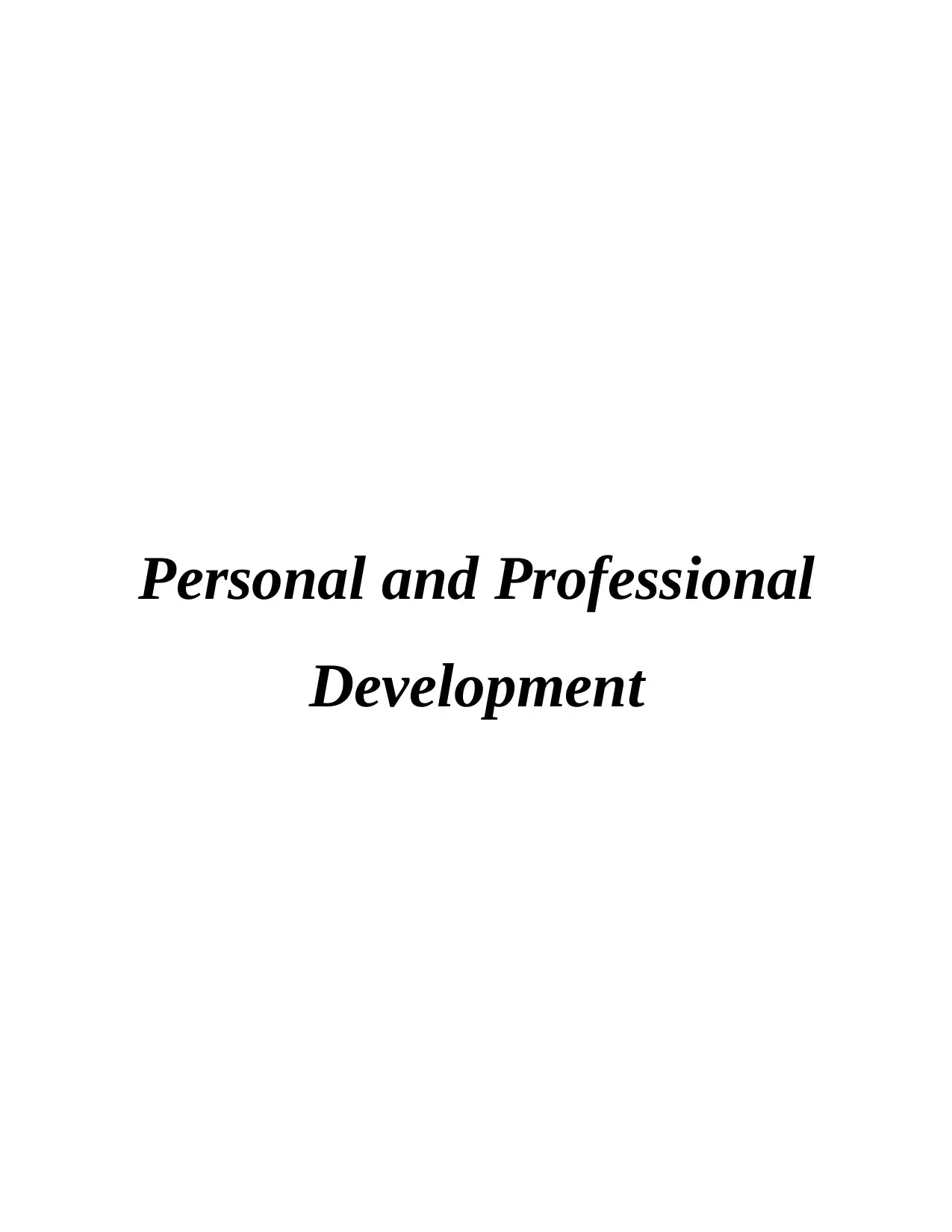
Personal and Professional
Development
Development
Paraphrase This Document
Need a fresh take? Get an instant paraphrase of this document with our AI Paraphraser
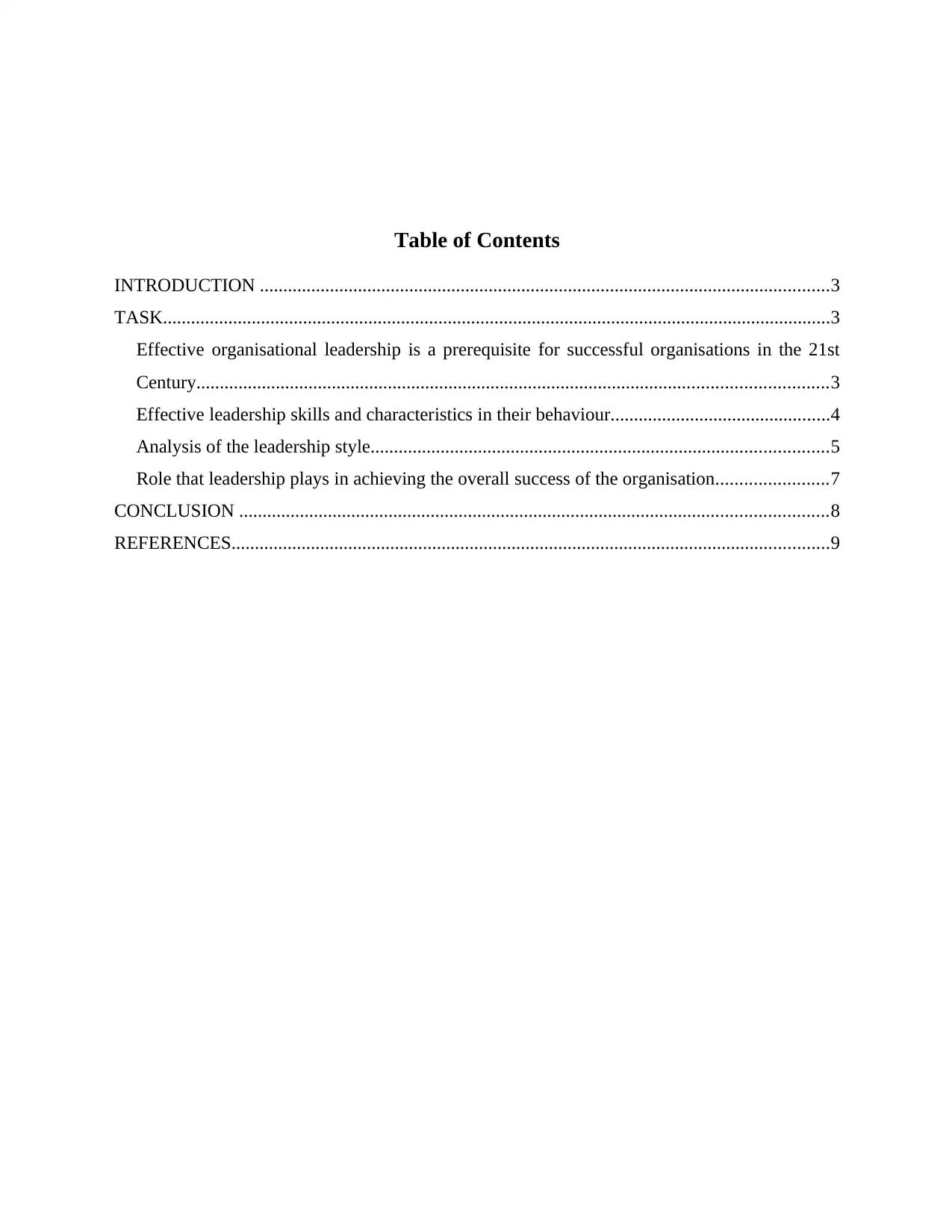
Table of Contents
INTRODUCTION ..........................................................................................................................3
TASK...............................................................................................................................................3
Effective organisational leadership is a prerequisite for successful organisations in the 21st
Century.......................................................................................................................................3
Effective leadership skills and characteristics in their behaviour...............................................4
Analysis of the leadership style..................................................................................................5
Role that leadership plays in achieving the overall success of the organisation........................7
CONCLUSION ..............................................................................................................................8
REFERENCES................................................................................................................................9
INTRODUCTION ..........................................................................................................................3
TASK...............................................................................................................................................3
Effective organisational leadership is a prerequisite for successful organisations in the 21st
Century.......................................................................................................................................3
Effective leadership skills and characteristics in their behaviour...............................................4
Analysis of the leadership style..................................................................................................5
Role that leadership plays in achieving the overall success of the organisation........................7
CONCLUSION ..............................................................................................................................8
REFERENCES................................................................................................................................9
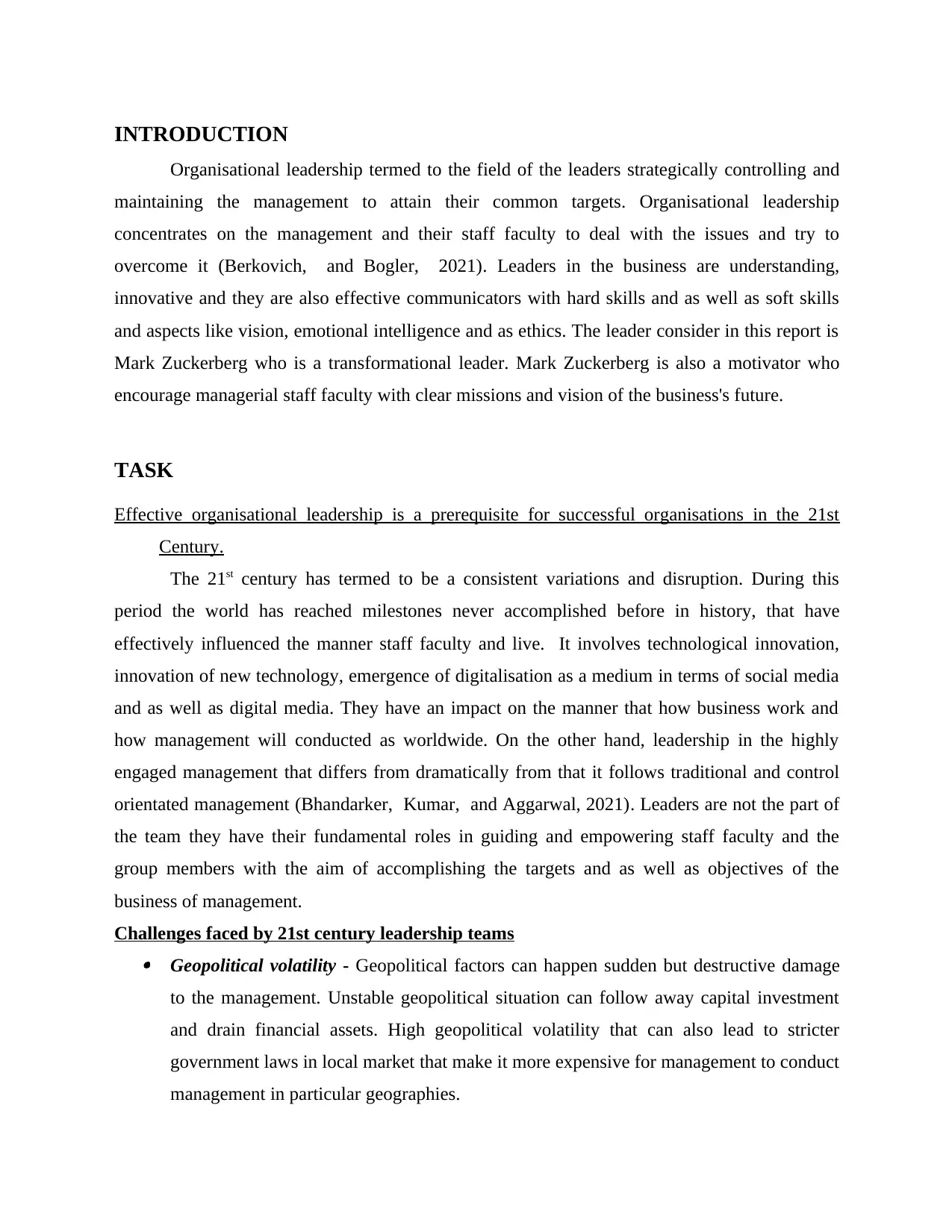
INTRODUCTION
Organisational leadership termed to the field of the leaders strategically controlling and
maintaining the management to attain their common targets. Organisational leadership
concentrates on the management and their staff faculty to deal with the issues and try to
overcome it (Berkovich, and Bogler, 2021). Leaders in the business are understanding,
innovative and they are also effective communicators with hard skills and as well as soft skills
and aspects like vision, emotional intelligence and as ethics. The leader consider in this report is
Mark Zuckerberg who is a transformational leader. Mark Zuckerberg is also a motivator who
encourage managerial staff faculty with clear missions and vision of the business's future.
TASK
Effective organisational leadership is a prerequisite for successful organisations in the 21st
Century.
The 21st century has termed to be a consistent variations and disruption. During this
period the world has reached milestones never accomplished before in history, that have
effectively influenced the manner staff faculty and live. It involves technological innovation,
innovation of new technology, emergence of digitalisation as a medium in terms of social media
and as well as digital media. They have an impact on the manner that how business work and
how management will conducted as worldwide. On the other hand, leadership in the highly
engaged management that differs from dramatically from that it follows traditional and control
orientated management (Bhandarker, Kumar, and Aggarwal, 2021). Leaders are not the part of
the team they have their fundamental roles in guiding and empowering staff faculty and the
group members with the aim of accomplishing the targets and as well as objectives of the
business of management.
Challenges faced by 21st century leadership teams Geopolitical volatility - Geopolitical factors can happen sudden but destructive damage
to the management. Unstable geopolitical situation can follow away capital investment
and drain financial assets. High geopolitical volatility that can also lead to stricter
government laws in local market that make it more expensive for management to conduct
management in particular geographies.
Organisational leadership termed to the field of the leaders strategically controlling and
maintaining the management to attain their common targets. Organisational leadership
concentrates on the management and their staff faculty to deal with the issues and try to
overcome it (Berkovich, and Bogler, 2021). Leaders in the business are understanding,
innovative and they are also effective communicators with hard skills and as well as soft skills
and aspects like vision, emotional intelligence and as ethics. The leader consider in this report is
Mark Zuckerberg who is a transformational leader. Mark Zuckerberg is also a motivator who
encourage managerial staff faculty with clear missions and vision of the business's future.
TASK
Effective organisational leadership is a prerequisite for successful organisations in the 21st
Century.
The 21st century has termed to be a consistent variations and disruption. During this
period the world has reached milestones never accomplished before in history, that have
effectively influenced the manner staff faculty and live. It involves technological innovation,
innovation of new technology, emergence of digitalisation as a medium in terms of social media
and as well as digital media. They have an impact on the manner that how business work and
how management will conducted as worldwide. On the other hand, leadership in the highly
engaged management that differs from dramatically from that it follows traditional and control
orientated management (Bhandarker, Kumar, and Aggarwal, 2021). Leaders are not the part of
the team they have their fundamental roles in guiding and empowering staff faculty and the
group members with the aim of accomplishing the targets and as well as objectives of the
business of management.
Challenges faced by 21st century leadership teams Geopolitical volatility - Geopolitical factors can happen sudden but destructive damage
to the management. Unstable geopolitical situation can follow away capital investment
and drain financial assets. High geopolitical volatility that can also lead to stricter
government laws in local market that make it more expensive for management to conduct
management in particular geographies.
⊘ This is a preview!⊘
Do you want full access?
Subscribe today to unlock all pages.

Trusted by 1+ million students worldwide
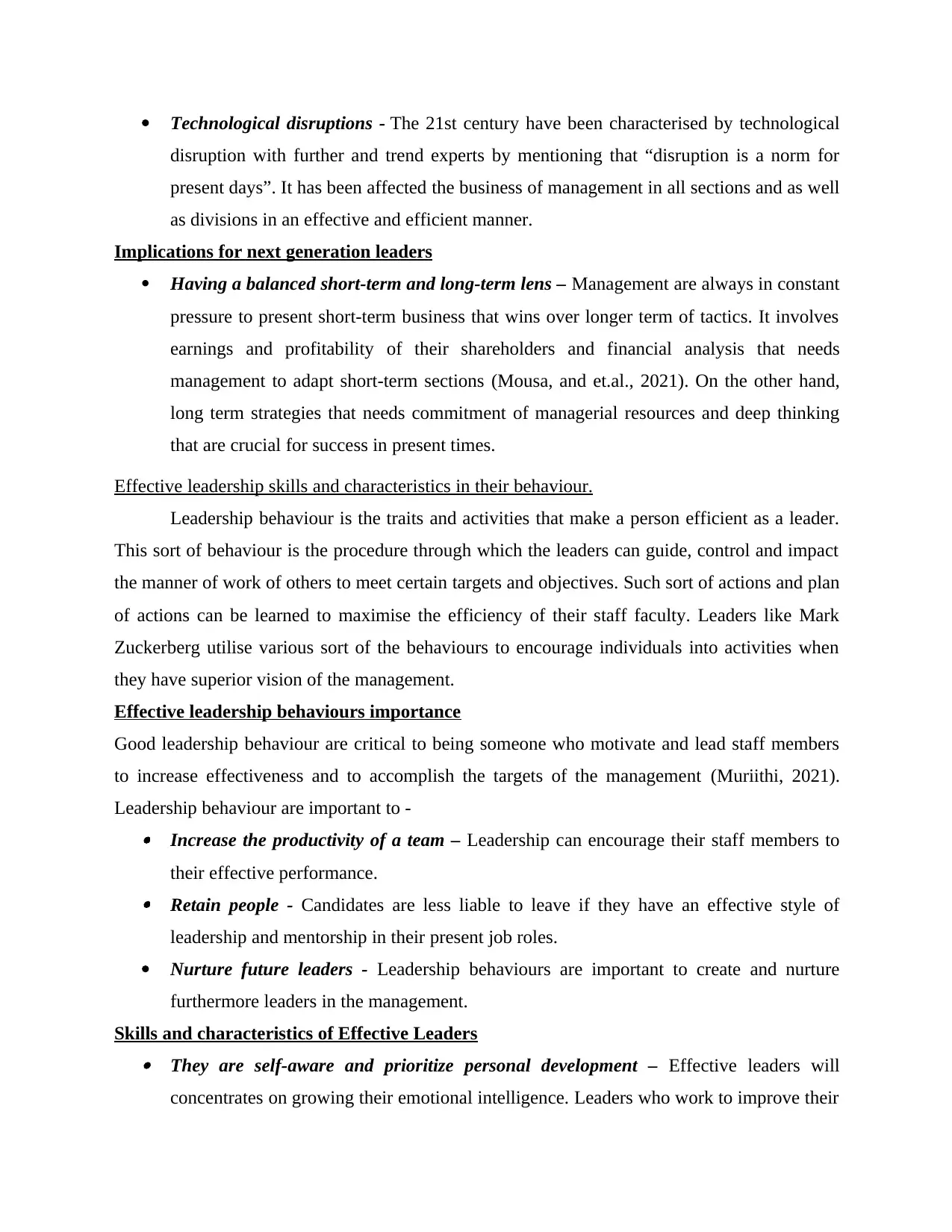
Technological disruptions - The 21st century have been characterised by technological
disruption with further and trend experts by mentioning that “disruption is a norm for
present days”. It has been affected the business of management in all sections and as well
as divisions in an effective and efficient manner.
Implications for next generation leaders
Having a balanced short-term and long-term lens – Management are always in constant
pressure to present short-term business that wins over longer term of tactics. It involves
earnings and profitability of their shareholders and financial analysis that needs
management to adapt short-term sections (Mousa, and et.al., 2021). On the other hand,
long term strategies that needs commitment of managerial resources and deep thinking
that are crucial for success in present times.
Effective leadership skills and characteristics in their behaviour.
Leadership behaviour is the traits and activities that make a person efficient as a leader.
This sort of behaviour is the procedure through which the leaders can guide, control and impact
the manner of work of others to meet certain targets and objectives. Such sort of actions and plan
of actions can be learned to maximise the efficiency of their staff faculty. Leaders like Mark
Zuckerberg utilise various sort of the behaviours to encourage individuals into activities when
they have superior vision of the management.
Effective leadership behaviours importance
Good leadership behaviour are critical to being someone who motivate and lead staff members
to increase effectiveness and to accomplish the targets of the management (Muriithi, 2021).
Leadership behaviour are important to - Increase the productivity of a team – Leadership can encourage their staff members to
their effective performance. Retain people - Candidates are less liable to leave if they have an effective style of
leadership and mentorship in their present job roles.
Nurture future leaders - Leadership behaviours are important to create and nurture
furthermore leaders in the management.
Skills and characteristics of Effective Leaders They are self-aware and prioritize personal development – Effective leaders will
concentrates on growing their emotional intelligence. Leaders who work to improve their
disruption with further and trend experts by mentioning that “disruption is a norm for
present days”. It has been affected the business of management in all sections and as well
as divisions in an effective and efficient manner.
Implications for next generation leaders
Having a balanced short-term and long-term lens – Management are always in constant
pressure to present short-term business that wins over longer term of tactics. It involves
earnings and profitability of their shareholders and financial analysis that needs
management to adapt short-term sections (Mousa, and et.al., 2021). On the other hand,
long term strategies that needs commitment of managerial resources and deep thinking
that are crucial for success in present times.
Effective leadership skills and characteristics in their behaviour.
Leadership behaviour is the traits and activities that make a person efficient as a leader.
This sort of behaviour is the procedure through which the leaders can guide, control and impact
the manner of work of others to meet certain targets and objectives. Such sort of actions and plan
of actions can be learned to maximise the efficiency of their staff faculty. Leaders like Mark
Zuckerberg utilise various sort of the behaviours to encourage individuals into activities when
they have superior vision of the management.
Effective leadership behaviours importance
Good leadership behaviour are critical to being someone who motivate and lead staff members
to increase effectiveness and to accomplish the targets of the management (Muriithi, 2021).
Leadership behaviour are important to - Increase the productivity of a team – Leadership can encourage their staff members to
their effective performance. Retain people - Candidates are less liable to leave if they have an effective style of
leadership and mentorship in their present job roles.
Nurture future leaders - Leadership behaviours are important to create and nurture
furthermore leaders in the management.
Skills and characteristics of Effective Leaders They are self-aware and prioritize personal development – Effective leaders will
concentrates on growing their emotional intelligence. Leaders who work to improve their
Paraphrase This Document
Need a fresh take? Get an instant paraphrase of this document with our AI Paraphraser
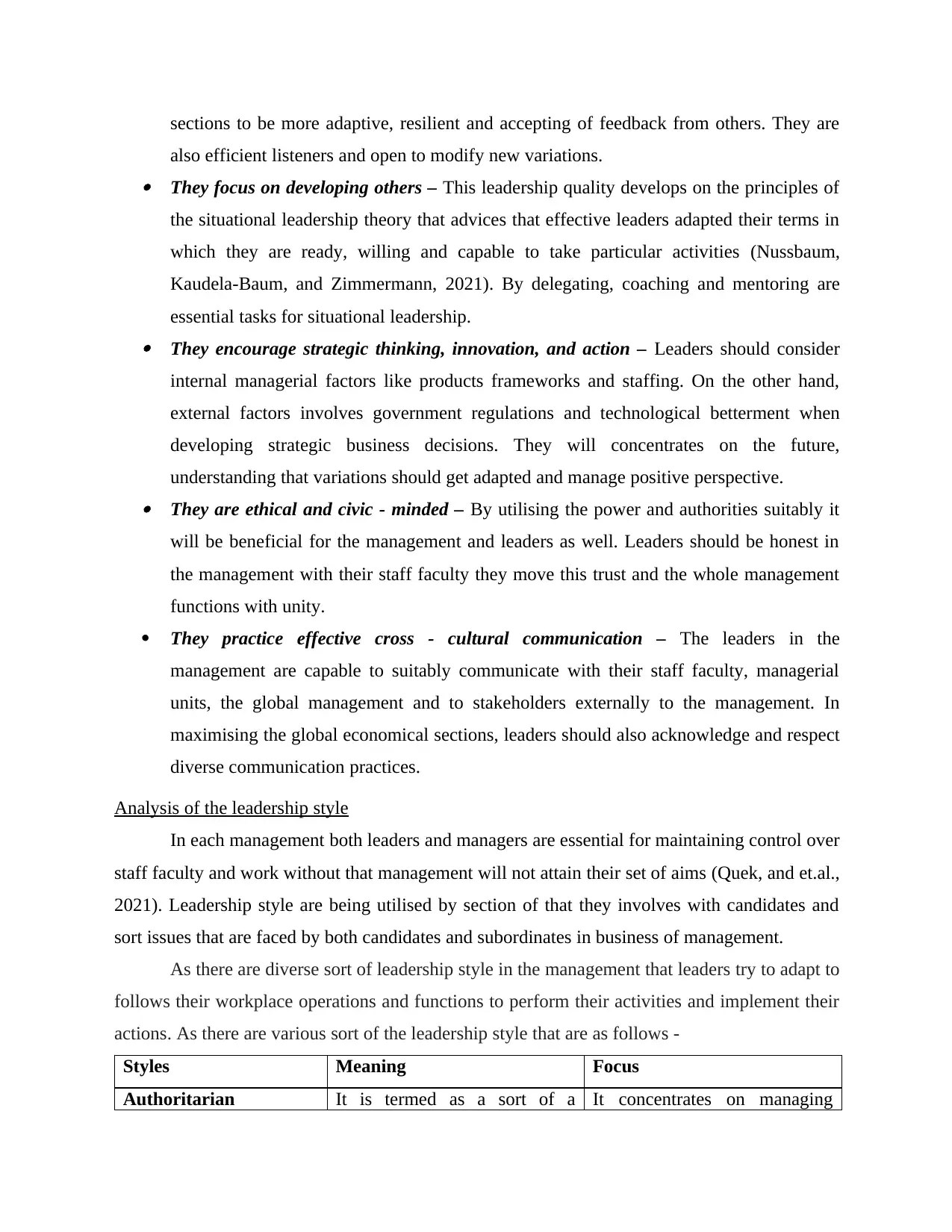
sections to be more adaptive, resilient and accepting of feedback from others. They are
also efficient listeners and open to modify new variations. They focus on developing others – This leadership quality develops on the principles of
the situational leadership theory that advices that effective leaders adapted their terms in
which they are ready, willing and capable to take particular activities (Nussbaum,
Kaudela-Baum, and Zimmermann, 2021). By delegating, coaching and mentoring are
essential tasks for situational leadership. They encourage strategic thinking, innovation, and action – Leaders should consider
internal managerial factors like products frameworks and staffing. On the other hand,
external factors involves government regulations and technological betterment when
developing strategic business decisions. They will concentrates on the future,
understanding that variations should get adapted and manage positive perspective. They are ethical and civic - minded – By utilising the power and authorities suitably it
will be beneficial for the management and leaders as well. Leaders should be honest in
the management with their staff faculty they move this trust and the whole management
functions with unity.
They practice effective cross - cultural communication – The leaders in the
management are capable to suitably communicate with their staff faculty, managerial
units, the global management and to stakeholders externally to the management. In
maximising the global economical sections, leaders should also acknowledge and respect
diverse communication practices.
Analysis of the leadership style
In each management both leaders and managers are essential for maintaining control over
staff faculty and work without that management will not attain their set of aims (Quek, and et.al.,
2021). Leadership style are being utilised by section of that they involves with candidates and
sort issues that are faced by both candidates and subordinates in business of management.
As there are diverse sort of leadership style in the management that leaders try to adapt to
follows their workplace operations and functions to perform their activities and implement their
actions. As there are various sort of the leadership style that are as follows -
Styles Meaning Focus
Authoritarian It is termed as a sort of a It concentrates on managing
also efficient listeners and open to modify new variations. They focus on developing others – This leadership quality develops on the principles of
the situational leadership theory that advices that effective leaders adapted their terms in
which they are ready, willing and capable to take particular activities (Nussbaum,
Kaudela-Baum, and Zimmermann, 2021). By delegating, coaching and mentoring are
essential tasks for situational leadership. They encourage strategic thinking, innovation, and action – Leaders should consider
internal managerial factors like products frameworks and staffing. On the other hand,
external factors involves government regulations and technological betterment when
developing strategic business decisions. They will concentrates on the future,
understanding that variations should get adapted and manage positive perspective. They are ethical and civic - minded – By utilising the power and authorities suitably it
will be beneficial for the management and leaders as well. Leaders should be honest in
the management with their staff faculty they move this trust and the whole management
functions with unity.
They practice effective cross - cultural communication – The leaders in the
management are capable to suitably communicate with their staff faculty, managerial
units, the global management and to stakeholders externally to the management. In
maximising the global economical sections, leaders should also acknowledge and respect
diverse communication practices.
Analysis of the leadership style
In each management both leaders and managers are essential for maintaining control over
staff faculty and work without that management will not attain their set of aims (Quek, and et.al.,
2021). Leadership style are being utilised by section of that they involves with candidates and
sort issues that are faced by both candidates and subordinates in business of management.
As there are diverse sort of leadership style in the management that leaders try to adapt to
follows their workplace operations and functions to perform their activities and implement their
actions. As there are various sort of the leadership style that are as follows -
Styles Meaning Focus
Authoritarian It is termed as a sort of a It concentrates on managing
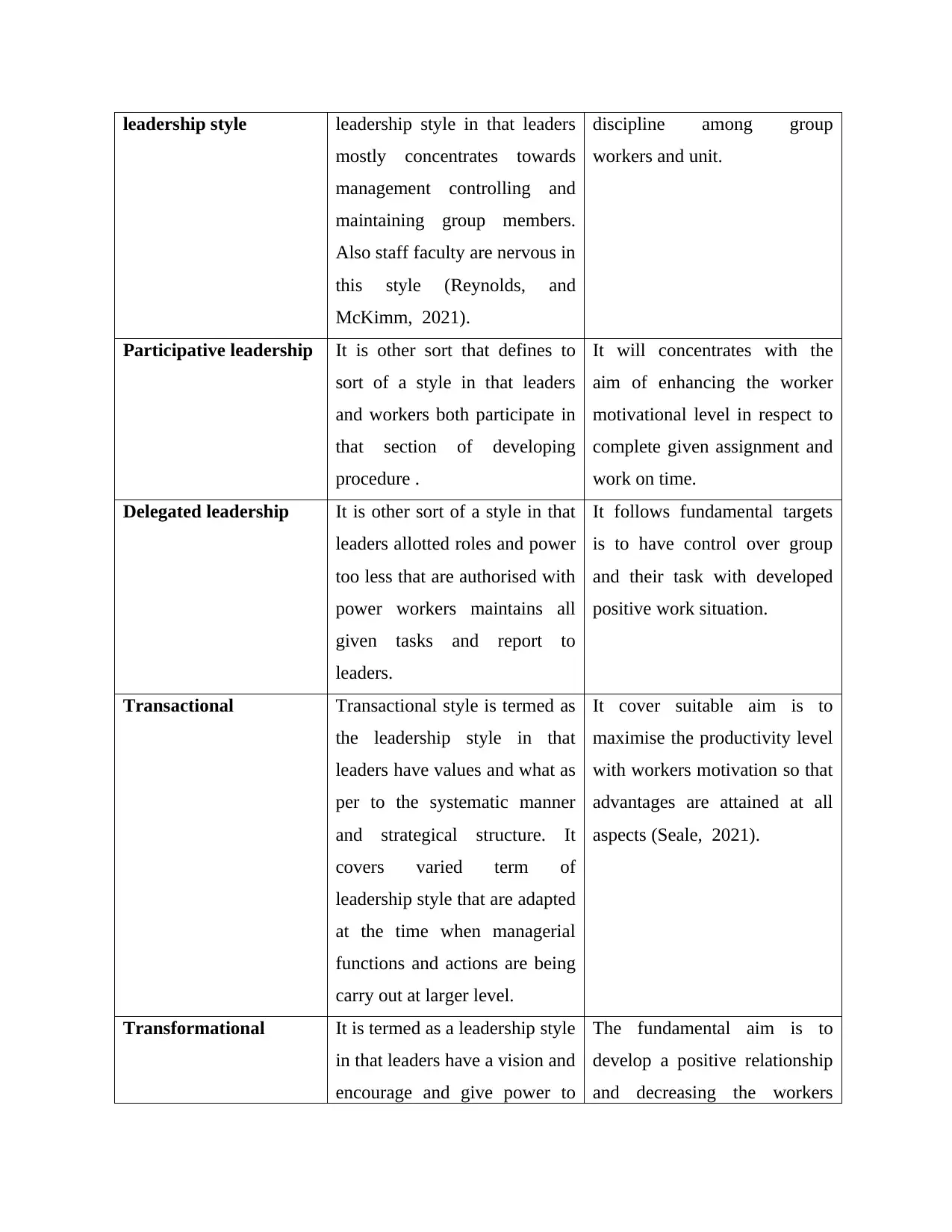
leadership style leadership style in that leaders
mostly concentrates towards
management controlling and
maintaining group members.
Also staff faculty are nervous in
this style (Reynolds, and
McKimm, 2021).
discipline among group
workers and unit.
Participative leadership It is other sort that defines to
sort of a style in that leaders
and workers both participate in
that section of developing
procedure .
It will concentrates with the
aim of enhancing the worker
motivational level in respect to
complete given assignment and
work on time.
Delegated leadership It is other sort of a style in that
leaders allotted roles and power
too less that are authorised with
power workers maintains all
given tasks and report to
leaders.
It follows fundamental targets
is to have control over group
and their task with developed
positive work situation.
Transactional Transactional style is termed as
the leadership style in that
leaders have values and what as
per to the systematic manner
and strategical structure. It
covers varied term of
leadership style that are adapted
at the time when managerial
functions and actions are being
carry out at larger level.
It cover suitable aim is to
maximise the productivity level
with workers motivation so that
advantages are attained at all
aspects (Seale, 2021).
Transformational It is termed as a leadership style
in that leaders have a vision and
encourage and give power to
The fundamental aim is to
develop a positive relationship
and decreasing the workers
mostly concentrates towards
management controlling and
maintaining group members.
Also staff faculty are nervous in
this style (Reynolds, and
McKimm, 2021).
discipline among group
workers and unit.
Participative leadership It is other sort that defines to
sort of a style in that leaders
and workers both participate in
that section of developing
procedure .
It will concentrates with the
aim of enhancing the worker
motivational level in respect to
complete given assignment and
work on time.
Delegated leadership It is other sort of a style in that
leaders allotted roles and power
too less that are authorised with
power workers maintains all
given tasks and report to
leaders.
It follows fundamental targets
is to have control over group
and their task with developed
positive work situation.
Transactional Transactional style is termed as
the leadership style in that
leaders have values and what as
per to the systematic manner
and strategical structure. It
covers varied term of
leadership style that are adapted
at the time when managerial
functions and actions are being
carry out at larger level.
It cover suitable aim is to
maximise the productivity level
with workers motivation so that
advantages are attained at all
aspects (Seale, 2021).
Transformational It is termed as a leadership style
in that leaders have a vision and
encourage and give power to
The fundamental aim is to
develop a positive relationship
and decreasing the workers
⊘ This is a preview!⊘
Do you want full access?
Subscribe today to unlock all pages.

Trusted by 1+ million students worldwide
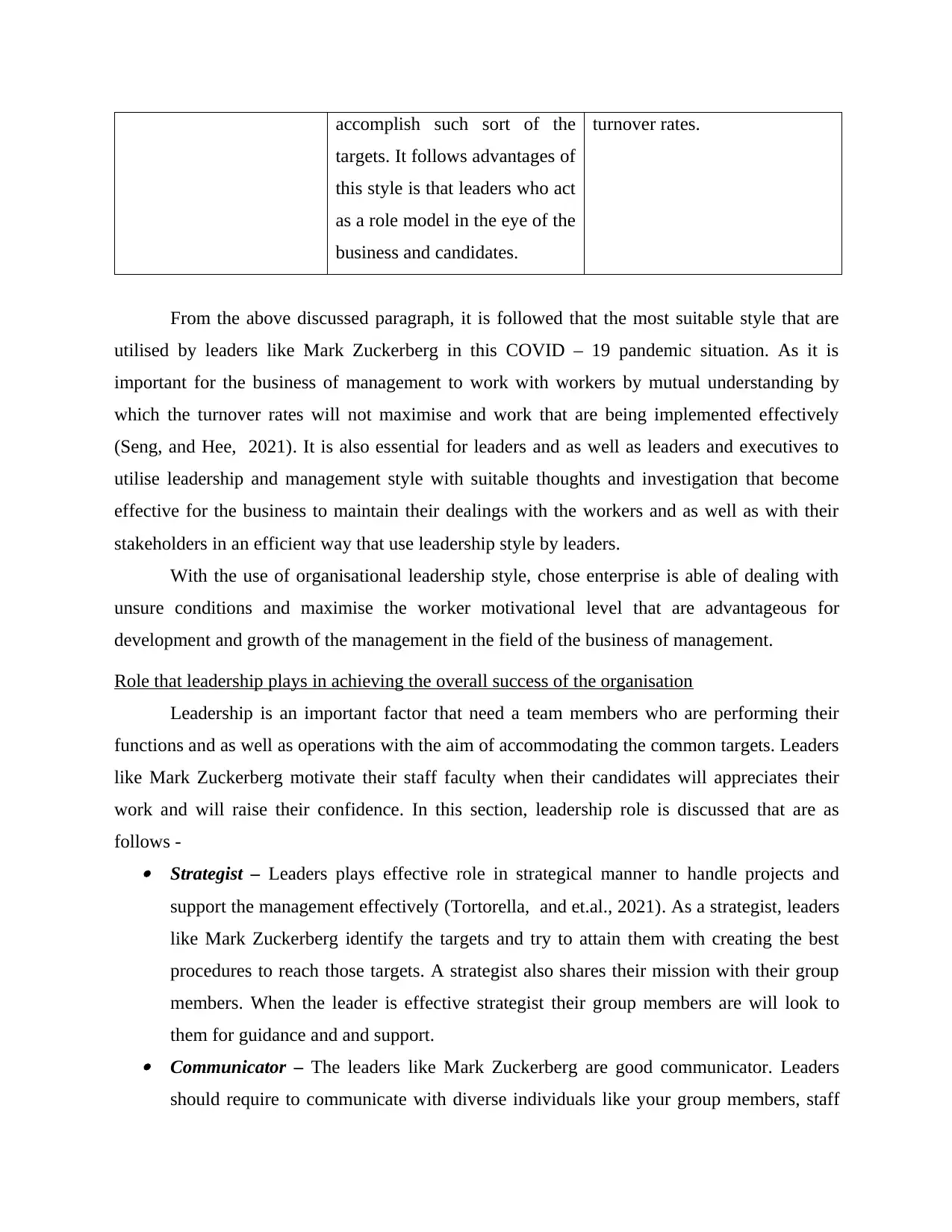
accomplish such sort of the
targets. It follows advantages of
this style is that leaders who act
as a role model in the eye of the
business and candidates.
turnover rates.
From the above discussed paragraph, it is followed that the most suitable style that are
utilised by leaders like Mark Zuckerberg in this COVID – 19 pandemic situation. As it is
important for the business of management to work with workers by mutual understanding by
which the turnover rates will not maximise and work that are being implemented effectively
(Seng, and Hee, 2021). It is also essential for leaders and as well as leaders and executives to
utilise leadership and management style with suitable thoughts and investigation that become
effective for the business to maintain their dealings with the workers and as well as with their
stakeholders in an efficient way that use leadership style by leaders.
With the use of organisational leadership style, chose enterprise is able of dealing with
unsure conditions and maximise the worker motivational level that are advantageous for
development and growth of the management in the field of the business of management.
Role that leadership plays in achieving the overall success of the organisation
Leadership is an important factor that need a team members who are performing their
functions and as well as operations with the aim of accommodating the common targets. Leaders
like Mark Zuckerberg motivate their staff faculty when their candidates will appreciates their
work and will raise their confidence. In this section, leadership role is discussed that are as
follows - Strategist – Leaders plays effective role in strategical manner to handle projects and
support the management effectively (Tortorella, and et.al., 2021). As a strategist, leaders
like Mark Zuckerberg identify the targets and try to attain them with creating the best
procedures to reach those targets. A strategist also shares their mission with their group
members. When the leader is effective strategist their group members are will look to
them for guidance and and support. Communicator – The leaders like Mark Zuckerberg are good communicator. Leaders
should require to communicate with diverse individuals like your group members, staff
targets. It follows advantages of
this style is that leaders who act
as a role model in the eye of the
business and candidates.
turnover rates.
From the above discussed paragraph, it is followed that the most suitable style that are
utilised by leaders like Mark Zuckerberg in this COVID – 19 pandemic situation. As it is
important for the business of management to work with workers by mutual understanding by
which the turnover rates will not maximise and work that are being implemented effectively
(Seng, and Hee, 2021). It is also essential for leaders and as well as leaders and executives to
utilise leadership and management style with suitable thoughts and investigation that become
effective for the business to maintain their dealings with the workers and as well as with their
stakeholders in an efficient way that use leadership style by leaders.
With the use of organisational leadership style, chose enterprise is able of dealing with
unsure conditions and maximise the worker motivational level that are advantageous for
development and growth of the management in the field of the business of management.
Role that leadership plays in achieving the overall success of the organisation
Leadership is an important factor that need a team members who are performing their
functions and as well as operations with the aim of accommodating the common targets. Leaders
like Mark Zuckerberg motivate their staff faculty when their candidates will appreciates their
work and will raise their confidence. In this section, leadership role is discussed that are as
follows - Strategist – Leaders plays effective role in strategical manner to handle projects and
support the management effectively (Tortorella, and et.al., 2021). As a strategist, leaders
like Mark Zuckerberg identify the targets and try to attain them with creating the best
procedures to reach those targets. A strategist also shares their mission with their group
members. When the leader is effective strategist their group members are will look to
them for guidance and and support. Communicator – The leaders like Mark Zuckerberg are good communicator. Leaders
should require to communicate with diverse individuals like your group members, staff
Paraphrase This Document
Need a fresh take? Get an instant paraphrase of this document with our AI Paraphraser
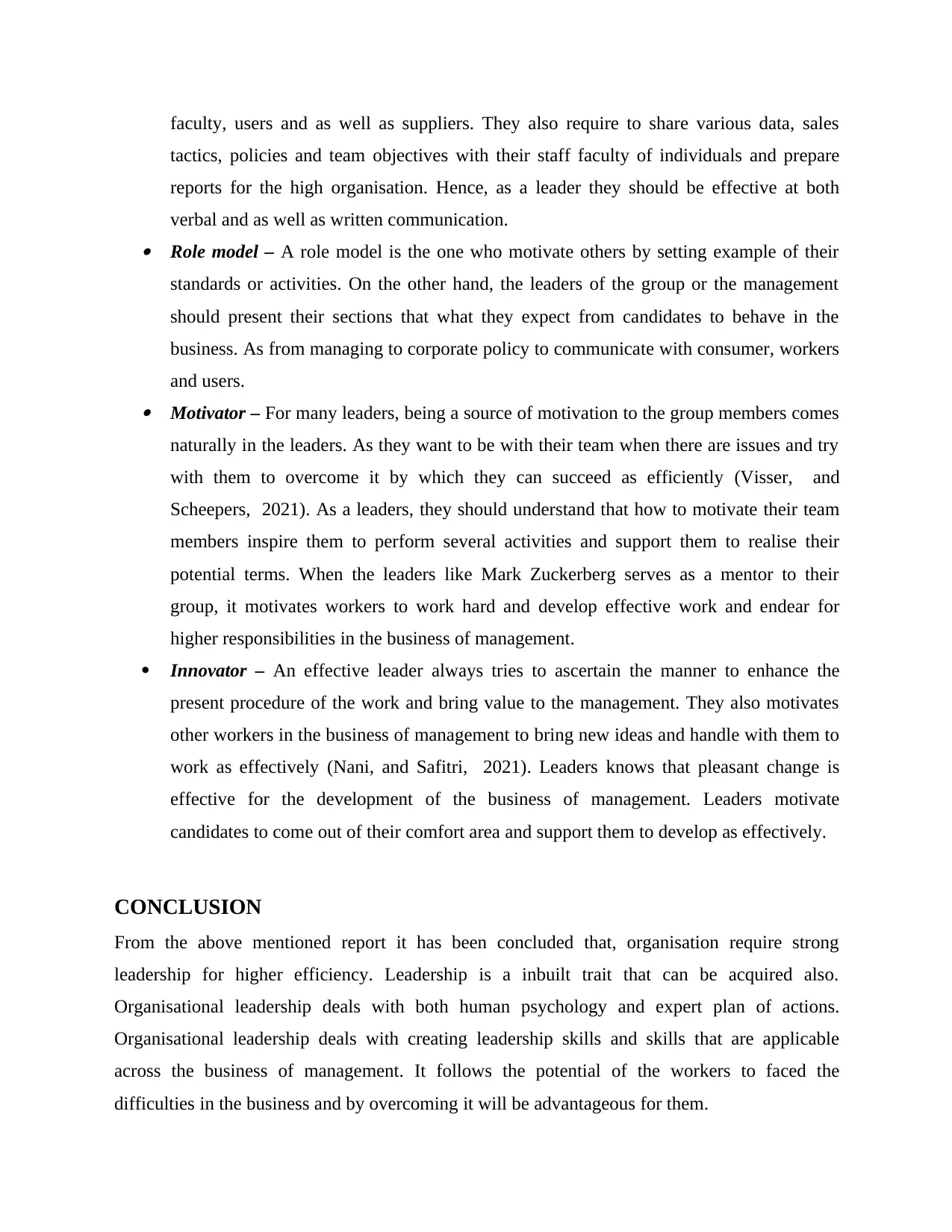
faculty, users and as well as suppliers. They also require to share various data, sales
tactics, policies and team objectives with their staff faculty of individuals and prepare
reports for the high organisation. Hence, as a leader they should be effective at both
verbal and as well as written communication. Role model – A role model is the one who motivate others by setting example of their
standards or activities. On the other hand, the leaders of the group or the management
should present their sections that what they expect from candidates to behave in the
business. As from managing to corporate policy to communicate with consumer, workers
and users. Motivator – For many leaders, being a source of motivation to the group members comes
naturally in the leaders. As they want to be with their team when there are issues and try
with them to overcome it by which they can succeed as efficiently (Visser, and
Scheepers, 2021). As a leaders, they should understand that how to motivate their team
members inspire them to perform several activities and support them to realise their
potential terms. When the leaders like Mark Zuckerberg serves as a mentor to their
group, it motivates workers to work hard and develop effective work and endear for
higher responsibilities in the business of management.
Innovator – An effective leader always tries to ascertain the manner to enhance the
present procedure of the work and bring value to the management. They also motivates
other workers in the business of management to bring new ideas and handle with them to
work as effectively (Nani, and Safitri, 2021). Leaders knows that pleasant change is
effective for the development of the business of management. Leaders motivate
candidates to come out of their comfort area and support them to develop as effectively.
CONCLUSION
From the above mentioned report it has been concluded that, organisation require strong
leadership for higher efficiency. Leadership is a inbuilt trait that can be acquired also.
Organisational leadership deals with both human psychology and expert plan of actions.
Organisational leadership deals with creating leadership skills and skills that are applicable
across the business of management. It follows the potential of the workers to faced the
difficulties in the business and by overcoming it will be advantageous for them.
tactics, policies and team objectives with their staff faculty of individuals and prepare
reports for the high organisation. Hence, as a leader they should be effective at both
verbal and as well as written communication. Role model – A role model is the one who motivate others by setting example of their
standards or activities. On the other hand, the leaders of the group or the management
should present their sections that what they expect from candidates to behave in the
business. As from managing to corporate policy to communicate with consumer, workers
and users. Motivator – For many leaders, being a source of motivation to the group members comes
naturally in the leaders. As they want to be with their team when there are issues and try
with them to overcome it by which they can succeed as efficiently (Visser, and
Scheepers, 2021). As a leaders, they should understand that how to motivate their team
members inspire them to perform several activities and support them to realise their
potential terms. When the leaders like Mark Zuckerberg serves as a mentor to their
group, it motivates workers to work hard and develop effective work and endear for
higher responsibilities in the business of management.
Innovator – An effective leader always tries to ascertain the manner to enhance the
present procedure of the work and bring value to the management. They also motivates
other workers in the business of management to bring new ideas and handle with them to
work as effectively (Nani, and Safitri, 2021). Leaders knows that pleasant change is
effective for the development of the business of management. Leaders motivate
candidates to come out of their comfort area and support them to develop as effectively.
CONCLUSION
From the above mentioned report it has been concluded that, organisation require strong
leadership for higher efficiency. Leadership is a inbuilt trait that can be acquired also.
Organisational leadership deals with both human psychology and expert plan of actions.
Organisational leadership deals with creating leadership skills and skills that are applicable
across the business of management. It follows the potential of the workers to faced the
difficulties in the business and by overcoming it will be advantageous for them.

⊘ This is a preview!⊘
Do you want full access?
Subscribe today to unlock all pages.

Trusted by 1+ million students worldwide
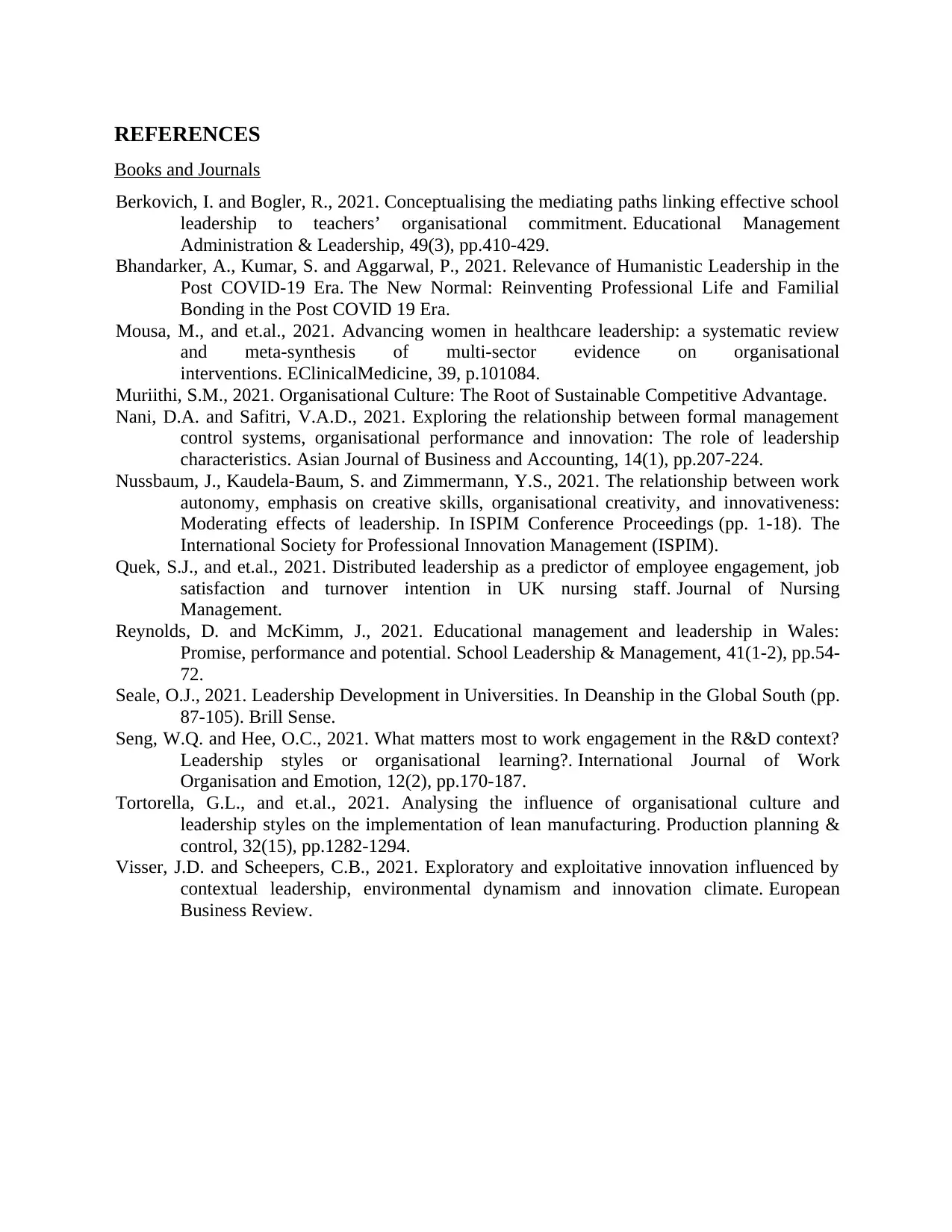
REFERENCES
Books and Journals
Berkovich, I. and Bogler, R., 2021. Conceptualising the mediating paths linking effective school
leadership to teachers’ organisational commitment. Educational Management
Administration & Leadership, 49(3), pp.410-429.
Bhandarker, A., Kumar, S. and Aggarwal, P., 2021. Relevance of Humanistic Leadership in the
Post COVID-19 Era. The New Normal: Reinventing Professional Life and Familial
Bonding in the Post COVID 19 Era.
Mousa, M., and et.al., 2021. Advancing women in healthcare leadership: a systematic review
and meta-synthesis of multi-sector evidence on organisational
interventions. EClinicalMedicine, 39, p.101084.
Muriithi, S.M., 2021. Organisational Culture: The Root of Sustainable Competitive Advantage.
Nani, D.A. and Safitri, V.A.D., 2021. Exploring the relationship between formal management
control systems, organisational performance and innovation: The role of leadership
characteristics. Asian Journal of Business and Accounting, 14(1), pp.207-224.
Nussbaum, J., Kaudela-Baum, S. and Zimmermann, Y.S., 2021. The relationship between work
autonomy, emphasis on creative skills, organisational creativity, and innovativeness:
Moderating effects of leadership. In ISPIM Conference Proceedings (pp. 1-18). The
International Society for Professional Innovation Management (ISPIM).
Quek, S.J., and et.al., 2021. Distributed leadership as a predictor of employee engagement, job
satisfaction and turnover intention in UK nursing staff. Journal of Nursing
Management.
Reynolds, D. and McKimm, J., 2021. Educational management and leadership in Wales:
Promise, performance and potential. School Leadership & Management, 41(1-2), pp.54-
72.
Seale, O.J., 2021. Leadership Development in Universities. In Deanship in the Global South (pp.
87-105). Brill Sense.
Seng, W.Q. and Hee, O.C., 2021. What matters most to work engagement in the R&D context?
Leadership styles or organisational learning?. International Journal of Work
Organisation and Emotion, 12(2), pp.170-187.
Tortorella, G.L., and et.al., 2021. Analysing the influence of organisational culture and
leadership styles on the implementation of lean manufacturing. Production planning &
control, 32(15), pp.1282-1294.
Visser, J.D. and Scheepers, C.B., 2021. Exploratory and exploitative innovation influenced by
contextual leadership, environmental dynamism and innovation climate. European
Business Review.
Books and Journals
Berkovich, I. and Bogler, R., 2021. Conceptualising the mediating paths linking effective school
leadership to teachers’ organisational commitment. Educational Management
Administration & Leadership, 49(3), pp.410-429.
Bhandarker, A., Kumar, S. and Aggarwal, P., 2021. Relevance of Humanistic Leadership in the
Post COVID-19 Era. The New Normal: Reinventing Professional Life and Familial
Bonding in the Post COVID 19 Era.
Mousa, M., and et.al., 2021. Advancing women in healthcare leadership: a systematic review
and meta-synthesis of multi-sector evidence on organisational
interventions. EClinicalMedicine, 39, p.101084.
Muriithi, S.M., 2021. Organisational Culture: The Root of Sustainable Competitive Advantage.
Nani, D.A. and Safitri, V.A.D., 2021. Exploring the relationship between formal management
control systems, organisational performance and innovation: The role of leadership
characteristics. Asian Journal of Business and Accounting, 14(1), pp.207-224.
Nussbaum, J., Kaudela-Baum, S. and Zimmermann, Y.S., 2021. The relationship between work
autonomy, emphasis on creative skills, organisational creativity, and innovativeness:
Moderating effects of leadership. In ISPIM Conference Proceedings (pp. 1-18). The
International Society for Professional Innovation Management (ISPIM).
Quek, S.J., and et.al., 2021. Distributed leadership as a predictor of employee engagement, job
satisfaction and turnover intention in UK nursing staff. Journal of Nursing
Management.
Reynolds, D. and McKimm, J., 2021. Educational management and leadership in Wales:
Promise, performance and potential. School Leadership & Management, 41(1-2), pp.54-
72.
Seale, O.J., 2021. Leadership Development in Universities. In Deanship in the Global South (pp.
87-105). Brill Sense.
Seng, W.Q. and Hee, O.C., 2021. What matters most to work engagement in the R&D context?
Leadership styles or organisational learning?. International Journal of Work
Organisation and Emotion, 12(2), pp.170-187.
Tortorella, G.L., and et.al., 2021. Analysing the influence of organisational culture and
leadership styles on the implementation of lean manufacturing. Production planning &
control, 32(15), pp.1282-1294.
Visser, J.D. and Scheepers, C.B., 2021. Exploratory and exploitative innovation influenced by
contextual leadership, environmental dynamism and innovation climate. European
Business Review.
1 out of 10
Related Documents
Your All-in-One AI-Powered Toolkit for Academic Success.
+13062052269
info@desklib.com
Available 24*7 on WhatsApp / Email
![[object Object]](/_next/static/media/star-bottom.7253800d.svg)
Unlock your academic potential
Copyright © 2020–2026 A2Z Services. All Rights Reserved. Developed and managed by ZUCOL.




